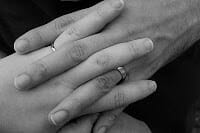
What If He Won’t Go to See a Counselor?
January 2, 2011Focus = Happiness
January 2, 2011Understanding Anxiety
Everybody has some familiarity with feeling anxious. Anxiety is the feeling of worry, apprehension, fear and/or panic in response to situations which seem overwhelming, threatening, unsafe or uncomfortable. You may experience anxiety as an intense worry before a final exam, the nervousness felt before making a presentation, or the heightened alertness when you believe you are in danger. Anxiety is your body’s way of alerting you that some kind of action is needed in the face of a situation that is perceived to be threatening or dangerous. Therefore, anxiety can be useful or adaptive whenever it prompts you to take appropriate action in response to an anxiety-provoking situation. For example, anxiety can motivate you to study for an exam or organize a presentation or leave a situation that feels unsafe. However, anxiety can also be detrimental, especially if it becomes overwhelming and prevents you from taking appropriate actions or prompts you to take actions that are counterproductive. Anxiety may be detrimental if you avoid studying for a major exam that worries you, or if you cope with worry about your relationship by getting unnecessarily suspicious and then yelling at your partner. This brochure will help you distinguish between normal or expected anxiety that everyone experiences and anxiety problems which may require intervention.
Because the feeling of anxiety is frequently intense and distressing, it is quite normal to want to avoid or eliminate these feelings. However, this is not necessarily the best approach to anxiety. If you ignore or try to eliminate your anxieties, you miss out on valuable information about your life and about your options for dealing with unavoidably stressful and demanding situations. It is often a better approach to begin with assessing the degree to which your anxiety works for you or is excessive and a source of problems for you. Counseling can assist you with treating anxiety and moving forward.
Since anxiety is a basic human emotion, like sadness, how do you know if anxiety is a problem? The following will help you determine whether anxiety could be partly responsible for some of the problems you are experiencing:
* Do I feel anxious more often than not throughout my day?
* Have I restricted my activities as a way of coping with anxiety?
* Do I experience panic or panic-like symptoms in certain predictable situations?
* Am I intensely fearful of specific situations or things (e.g., animals)?
* Do I experience acute anxiety in social situations?
* Have I developed elaborate rituals or thought-processes to manage anxiety?
* Is my anxiety related to a specific, traumatic event?
If you answered yes to some of the previous questions, you may have more specific questions about the anxiety symptoms you have been experiencing. The following are various conditions for which anxiety is the predominant feature.
Types of Anxiety
Panic Disorder
A panic attack is defined as a period of intense fear or discomfort accompanied by physical symptoms such as sweating, trembling and chest pain as well as cognitive symptoms such as fear of losing control and/or dying. A panic attack can be associated with any of the anxiety disorders, but panic disorder itself is characterized by recurrent, unexpected panic attacks and persistent concerns about having additional panic attacks.
Specific Phobia
The anxiety in specific phobia is associated with persistent, excessive and unreasonable fear when there is an anticipated or actual encounter with a specific object or situation. There can be significant anxiety and sometimes panic whenever a phobic person is exposed to the feared object or situation. Some examples of specific phobias include fear of certain animals, fear of heights, fear of blood or fear of places such as bridges or elevators.
Social Phobia
Social phobia is defined as a marked and persistent fear of a social situation or a performance in which embarrassment is considered to be a likely outcome. A fear of public speaking is one of the more common forms of social phobia. In all instances of social phobia, there is acute anxiety whenever the feared situation or performance is anticipated or encountered and there is frequently a strong desire for avoidance.
Obsessive-Compulsive Disorder
The presence of recurrent obsessions and compulsions which are time-consuming, impair life activities, and are recognized by the person as being excessive or unreasonable are features of this condition. An obsession is defined as persistent ideas, thoughts, impulses or images which are intrusive, anxiety-provoking and distressing. A compulsion is a ritualistic behavior which is intended to modify or reduce the anxiety through activity or behavior. The most frequent compulsions involve washing and cleaning, counting, seeking assurances, checking and/or repeating actions.
Post-traumatic Stress Disorder
The anxiety in Post-traumatic Stress Disorder is clearly associated with a traumatic event that the person experienced or witnessed and was associated with intense fear, horror or helplessness. In addition, there are recurrent, intrusive recollections of the events which are anxiety-provoking and distressing to the person. There may be avoidance of any situations associated with the original trauma and other anxiety-related symptoms such as hyper-vigilance or exaggerated startle response.
Generalized Anxiety Disorder
The primary feature of Generalized Anxiety Disorder is excessive anxiety and worry which occurs more days than not for a period of at least six months. In addition, symptoms of restlessness, fatigue, concentration problems, irritability, muscle tension and sleep disturbance may be present. The anxiety is perceived by the individual as being difficult to control or regulate.
Treatment of Anxiety
If anxiety symptoms are interfering with your ability to do routine, day-to-day activities, or if you have restricted your life activities as a way of coping with anxiety, you should consider seeking counseling. There are currently a variety of highly effective interventions available for the treatment of anxiety, including psychotherapy, cognitive-behavioral therapies, and medication. If you seek treatment in Fargo, the recommendations you receive will likely depend on the specific symptoms you are experiencing. All of the anxiety disorders are treatable and many individuals experience a full recovery from their symptoms.
What Can I Do?
It is usually helpful to identify the events surrounding the experience of anxiety:
* What provokes the anxiety?
* What thoughts or physical sensations accompany the anxiety?
* How distressing is the anxiety?
* How are you coping with the anxiety?
Exploring these accompanying events may provide useful information about the nature of the anxiety as well as possible strategies for reducing it. In addition, there are specific changes you can make that may help alleviate anxiety symptoms:
* Exercise or engage in some form of daily physical activity
* Eat a nutritious, well-balanced diet
* Obtain an adequate amount of sleep
* Seek emotional support from friends and family
* Focus on positive aspects of your life
* Establish realistic goals which do not rely on perfectionistic values
* Monitor how you think about stress and reduce thoughts which are negative
* Identify activities which feel overwhelming and reduce your involvement or
seek ways to make them more manageable
* Consult with a physician if you are experiencing any medical problems
* Consult with a counselor
* Reduce use of alcohol and drugs and limit caffeine intake
* Don’t let your emotions guide your reasoning
* Don’t assume responsibility for events which are outside of your control
Talk with a counselor about individual counseling to treat anxiety.


